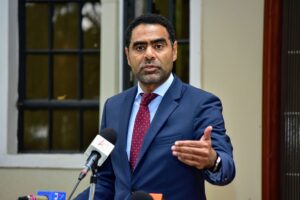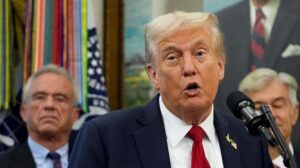Zaheer Jhanda’s latest move has stirred anger and suspicion among many Kenyans who see it as yet another attempt by the political class to tighten control over free speech.
His proposal to regulate social media influencers through a law that demands university degrees for anyone sharing opinions on professional topics has been viewed by many as misplaced and self-serving.
At a time when Kenyans are struggling with economic hardship, unemployment, and government scandals, it appears Jhanda is more interested in silencing critics than addressing real national problems.
By pushing for what he calls the Social Media Influencers Degrees Bill, the Nyaribari Chache MP is walking into dangerous territory. The idea that someone must hold a degree to discuss issues like health, law, or finance online not only limits expression but also exposes an elitist mindset.
Jhanda, who is not known for championing digital innovation or youth empowerment, suddenly wants to dictate who can speak online. It raises the question of whether the goal is to fight misinformation or to suppress independent voices that question authority.
While Jhanda insists the bill would help reduce misinformation on platforms such as TikTok, X, and YouTube, the problem runs deeper than unqualified influencers.
Most misinformation in Kenya does not come from ordinary citizens but from political figures and state-sponsored propaganda. Instead of holding leaders accountable for spreading lies, Jhanda seems determined to shift the blame to young Kenyans using social media to voice their frustrations.
His reference to China’s strict internet laws only adds to the concern, as that country’s policies are widely criticized for promoting censorship and limiting public discourse.
Jhanda’s justification that influencers must be “recognized by professional bodies” like the Law Society of Kenya or ICPAK is another sign of detachment from the realities of online life.
Many digital creators are self-taught and rely on personal experience, not formal education, to share insights that have helped thousands. Imposing degrees will lock out talented individuals who lack university qualifications but have valuable knowledge gained through experience.
It also opens doors for state interference, where content critical of the government could easily be labeled “unprofessional.”His push to force influencers to disclose qualifications online is another unnecessary intrusion.
What begins as a call for transparency could easily turn into surveillance and control. Such measures risk creating a digital divide between the privileged few who meet the state’s standards and the majority who depend on online platforms for livelihood and self-expression.
The timing of Jhanda’s proposal is also questionable. With Kenya’s economy under strain and public trust in leadership at an all-time low, introducing a bill that limits digital freedom only fuels public resentment.
Instead of addressing issues like unemployment or corruption, politicians now want to dictate who can talk about them. It paints Jhanda not as a reformer but as part of a political system that fears open conversation.
The law threatens to criminalize creativity under the pretext of professionalism. Kenya’s online community has long been a space for innovation, activism, and free thinking. Trying to regulate it through academic qualifications only undermines that progress.
Zaheer Jhanda’s plan may be presented as a fight against misinformation, but to many Kenyans, it looks like a deliberate attempt to silence voices that challenge the powerful.





















Add Comment